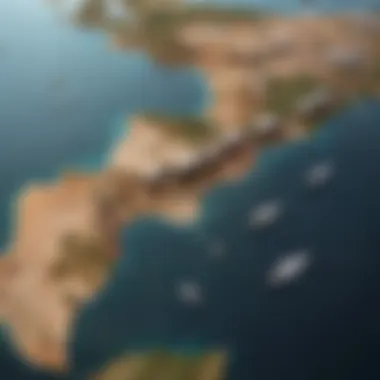Venezuela's Turmoil: Political and Economic Insights


Intro
Venezuela is a country that has captured global attention due to its tumultuous political and economic situation. Recent events have led to a deep analysis of the challenges the nation faces, shedding light on broader implications for the region and the world. From the impact of ongoing conflicts to significant migration trends, understanding Venezuela's developments is crucial for anyone interested in contemporary geopolitical issues.
What is venezuela latest:
The term "Venezuela latest" refers to the most recent updates and developments within the complex socio-political and economic landscape of the country. It encompasses changes in governance, economic reforms, social movements, and foreign relations.
Who created the venezuela latest?
The Venezuela latest is essentially driven by the dynamic interplay of various stakeholders: government officials, political parties, social activists, and international bodies. Each participant contributes to shaping the current narrative.
How many venezuela latest are there?
"Venezuela latest" does not refer to a specific quantity but is rather an ongoing collection of events. New developments emerge regularly, creating a continuously evolving understanding of the situation.
Does the venezuela latest have a purpose?
Yes, the purpose of staying informed about the latest developments in Venezuela is to grasp the intricacies of its crisis. Analyzing these updates allows observers to understand both the national and international ramifications of Venezuela’s trajectory.
What is the venezuela latest used for?
People use the Venezuela latest to stay updated on crucial political changes, economic shifts, and humanitarian efforts within the country. Furthermore, it facilitates discussions on international relations and the implications of foreign interventions.
The venezuela latest tokenomics depends on the following tokens
An integral part of understanding Venezuela’s recent developments includes analyzing economic indicators. Key tokens in this context might involve oil reserves, foreign investments, and international loans that affect the economy.
The venezuela latest ecosystem also includes the following tools
Tools such as economic reports, news articles, and non-governmental organizations’ analyses comprise the ecosystem. These resources provide insights into Venezuela's challenges and developments.
But why swap venezuela latest and not trade? What’s the difference?
Swapping refers to the exchange of information or resources, while trading typically involves a commercial transaction. In the context of Venezuela’s developments, it is crucial to exchange insights rather than merely trade facts. This fosters a comprehensive understanding of the evolving situation.
How to buy venezuela latest
Staying updated on the Venezuela latest can be done through various platforms. Reputable news websites, academic journals, and discussion forums such as Reddit are excellent sources. Following credible organizations on social media, like Facebook, can also provide valuable updates.
By understanding the complexities surrounding the Venezuela latest, one can better appreciate the intertwining factors contributing to the country’s situation. The ongoing developments indicate a broader narrative affecting economic stability, political governance, and humanitarian considerations, which deserve careful observation.
Political Landscape
The political landscape of Venezuela serves as the foundation for understanding the broader societal challenges the nation faces. Current dynamics underscore both the internal struggles and the implications of international relations. This situation has created a complex web of power, conflict, and resistance that influences the everyday lives of Venezuelans. Examining political systems, recent events, and the role of opposition movements will reveal the fundamental challenges that this South American nation confronts today.
Current Government Structure
Venezuela's government structure is defined by a centralized system that has undergone significant transformation over the last two decades. Currently, the nation operates under a system where the executive branch holds substantial authority. Nicolás Maduro, the president, has faced criticism for authoritarian practices that suppress dissent and limit democratic processes. The National Assembly, which was previously representative, now functions in a constrained manner due to government interventions. The judiciary is often perceived as biased, undermining the rule of law. These elements contribute to a polarized political environment, making governance increasingly challenging while igniting discontent among various demographics.
Recent Political Conflicts
Recent political conflicts in Venezuela reveal a landscape fraught with disputes that have escalated over time. Noteworthy conflicts have emerged between the government and various opposition factions, leading to widespread protests and civil unrest. The situation intensified following the 2018 presidential elections, which were deemed illegitimate by numerous international observers. This resulted in protests that asserted claims for democratic governance. Furthermore, the humanitarian crisis has added layers of conflict, impacting any meaningful dialogue between opposing sides. The role of external actors, notably the United States, has complicated these conflicts while stirring debates regarding sovereignty and interventionism.
Opposition Movements


Opposition movements in Venezuela are as varied as they are vocal against the Maduro regime. Groups like the Voluntad Popular and Primero Justicia represent critical political dissent. Their objectives range from advocating for human rights to demanding restoration of democratic processes. The difficulties they face are immense; many leaders have been exiled, imprisoned, or silenced, complicating their efforts. Despite these challenges, the opposition continues to organize, relying on grassroots support as well as international allies. The effectiveness of these movements often fluctuates, impacted by both internal strife and external pressures. Understanding these dynamics offers insight into the political motivations of the Venezuelan populace and the ongoing struggle for change.
Economic Crisis
Venezuela finds itself in the throes of an acute economic crisis, impacting nearly all facets of its society. Understanding the economic turmoil is crucial for anyone looking to grasp the complete picture of Venezuela's current situation. This section will delve into various elements such as hyperinflation, the heavy reliance on oil, and the effects of international sanctions. Each aspect outlines the pervasive challenges faced by Venezuelans and illustrates how these factors fuel one another, resulting in a cycle of decline.
Hyperinflation Effects
Hyperinflation in Venezuela has reached unprecedented levels. At its peak, inflation was estimated at over a million percent, annihilating the purchasing power of the average citizen. Basic necessities such as food, medicine, and household goods have become luxuries for many. This situation has forced increased reliance on foreign currency and bartering systems among citizens. Consequently, the collapse of the bolívar—the national currency—has shifted the economy towards the US dollar and cryptocurrencies, as people seek stable alternatives to navigate their daily lives.
The effects of hyperinflation extend beyond economic metrics; they permeate social structures.
“In a hyperinflational environment, frustration and despair can lead to social unrest and political instability.”
Individuals are more likely to protest against shortages and price hikes, reflecting a growing discontent with the government’s inability to manage the economy.
Oil Dependency
Venezuela’s economy is heavily dependent on oil, which constitutes a large percentage of its GDP and export revenues. The country's vast oil reserves, once a source of immense wealth, have turned into a liability. A combination of mismanagement, corruption, and the decline in global oil prices has exposed Venezuela's vulnerabilities. This dependency on oil has inhibited diversification, leaving the economy ill-equipped to handle fluctuations in oil revenue.
In this scenario, the local population suffers as less investment flows into social programs, which could mitigate the impacts of the crises faced today. The economy's over-reliance on oil contributes significantly to its instability and constrains future economic recovery options.
International Sanctions
Another layer to Venezuela's economic crisis involves international sanctions imposed chiefly by the United States and the European Union. These sanctions target individuals and sectors of the economy, particularly the oil industry. The intent is to pressure the government to change its policies, yet the ramifications are often felt by the broader population. Access to critical resources, such as food and medicine, is curtailed by these restrictions, exacerbating the humanitarian crisis.
Sanctions can limit foreign investments and trade, making recovery even more difficult. Moreover, the government often blames these sanctions for the economic plight, deflecting accountability from its own policy failures.
Social Dynamics
Understanding the social dynamics in Venezuela is crucial for a comprehensive analysis of the country's current state. The interrelation of political, economic, and societal factors plays a pivotal role in shaping the everyday lives of citizens. By examining key elements such as the humanitarian situation, migration patterns, and public health crisis, one gains insight into the complexities that define contemporary Venezuelan society. This exploration not only sheds light on the immediate impacts on individuals and communities but also highlights broader trends with implications for the region and the world.
Humanitarian Situation
The humanitarian situation in Venezuela has reached alarming levels. Many citizens face acute shortages of food, water, and medical supplies. Reports indicate that approximately 9.3 million people are likely suffering from malnutrition and food insecurity. This crisis is partly a consequence of the ongoing economic turmoil that has crippled local production and accessibility to basic goods.
Moreover, international aid organizations struggle to operate effectively. Bureaucratic hurdles and government restrictions hamper the flow of assistance. Healthcare infrastructure remains severely underfunded, with diminishing resources to treat various diseases, making it difficult for medical professionals to provide adequate care. This results in rising mortality rates, especially among vulnerable populations such as children and the elderly.
Migration Patterns
Venezuela has seen a massive exodus of its citizens in recent years. Economic despair and deteriorating living conditions have compelled over 6 million people to flee the country since 2014. The primary destinations include neighboring countries like Colombia and Brazil, where many seek refuge and better opportunities.
The migration crisis profoundly affects not only Venezuela but also the countries that accept these migrants. Host nations face challenges in integration and resource allocation. Many Venezuelians are forced to take low-paying jobs, often without legal status, which can lead to exploitation. Their presence, however, also enriches the receiving societies culturally and economically.
Public Health Crisis
The public health crisis in Venezuela underscores the systemic failures in the healthcare system. General practitioners have reported a resurgence of preventable diseases such as malaria and measles due to insufficient vaccination programs and healthcare access. Hospitals lack basic supplies, leaving healthcare providers with limited options to treat patients.
In addition, the ongoing COVID-19 pandemic has exposed deeper vulnerabilities within the system. Testing and vaccine distribution efforts are sluggish at best, exacerbating the public health challenges already faced by the population. The convergence of these factors contributes to a deteriorating quality of life, where even the most marginalized find it increasingly difficult to secure adequate health services.
"The unfolding social dynamics present a pressing call to action for policymakers and humanitarian agencies globally."
International Relations
Understanding international relations is crucial in the context of Venezuela's recent developments. The interplay between local actors and foreign influence shapes much of the current political and economic landscape. Venezuela's position within the global arena is marked by its alliances, conflicts, and treaties, which have direct impacts on its domestic situation.


The international landscape affects Venezuela's viability in trade, diplomacy, and social policies. Relations with neighboring countries, particularly in Latin America, often dictate the response to economic and humanitarian crises.
This section explores three main areas of international relations that have shaped Venezuela: the role of neighboring countries, U.S. foreign policy, and international human rights concerns.
Role of Neighboring Countries
Neighboring countries have played a pivotal role in Venezuela's current state. Nations such as Colombia and Brazil have both supported and criticized Venezuela's domestic policies. The migration crisis has led to significant ripple effects in these countries due to the influx of Venezuelan refugees seeking better opportunities. In 2021, roughly 5.6 million Venezuelans fled, with many heading to Colombia and Brazil.
Venezuela’s varied relations with these nations can be characterized by both cooperation and tension. Colombia, for instance, has hosted many Venezuelan migrants but also has a complicated relationship with the Maduro government, leading to border disputes and accusations of military incursions. Similarly, Brazil's government has oscillated between support for democratic movements and unilateral action based on humanitarian needs.
US Foreign Policy
U.S. foreign policy has often focused on promoting democracy and human rights, especially in Latin America. The economic sanctions imposed on Venezuela are a direct reflection of this goal. The sanctions target specific sectors, including the oil industry, which is a significant contributor to the Venezuelan economy. In recent years, these policies have intensified, aiming to pressure the Maduro regime for changes in governance.
The U.S. has taken a particular interest due to Venezuela's potential connection to larger geopolitical issues, including influence from Russia and China. Moreover, U.S.-backed initiatives have aimed to support opposition groups, ultimately pushing for a transition towards democratic governance. However, this has also led to backlash, with some sectors of the Venezuelan population viewing U.S. intervention as imperialistic.
International Human Rights Concerns
The ongoing crisis in Venezuela has drawn attention to serious human rights violations. Reports from international organizations have documented cases of arbitrary detentions, torture, and extrajudicial killings. The United Nations and Human Rights Watch have called for accountability in these actions, emphasizing the need for international legal frameworks to address these violations.
This aspect of international relations creates a complex narrative. Venezuela argues that these critiques are politically motivated, aimed at undermining its sovereignty. However, the mounting evidence of human rights abuses has pressured the international community to act. Questions of intervention and support for humanitarian efforts have emerged, challenging the balance between state sovereignty and human rights advocacy.
In summary, international relations concerning Venezuela encompass a web of local and global interactions that significantly impact its political, economic, and social dynamics. Understanding these relationships is essential to grasp the complexities surrounding the country's current situation.
Future Projections
Understanding the future projections for Venezuela is critical in addressing the intricate issues it faces today. These projections encapsulate potential political shifts, anticipated economic recovery mechanisms, and their subsequent social ramifications. By discerning these projections, stakeholders can better strategize interventions and support initiatives aimed at alleviating the suffering in the country. This section explores these dimensions in detail, providing a roadmap toward potential outcomes in a rapidly changing environment.
Predicted Political Outcomes
The political arena in Venezuela remains fraught with uncertainty. A shift in leadership could occur through an electoral process if the conditions allow for fair participation. Alternatively, the political landscape could continue to fragment, leading to heightened opposition tactics and protests, as any anticipated changes are perceived as insincere. The potential for genuine dialogue between opposing factions exists, but it heavily depends on external influences, such as international diplomacy and local demands for reform.
- Increased regional engagement may also influence outcomes, as neighboring countries have vested interests in a stable Venezuela.
- The role of influential political blocs, such as the Lima Group, could impact political resolutions.
- If major reforms are implemented, a slow rebuilding of public trust could pave the way for revitalized democratic governance.
Economic Recovery Possibilities
The economic landscape is equally pivotal when looking towards Venezuela's future. Hyperinflation has ravaged the economy, eroding purchasing power and resulting in significant poverty levels. However, experts identify potential pathways for recovery:
- Diversifying the economy beyond oil dependency is crucial for sustainable growth. This could help stabilize currency and create jobs.
- International aid could play a vital role. Initiatives from organizations like the International Monetary Fund and various non-profits might introduce much-needed capital and expertise.
- Engaging in trade agreements with neighboring countries could reinvigorate the economy and provide a broader market for Venezuelan products.
However, these possibilities rely heavily on political stability and reform. Without addressing governance issues, economic recovery might remain elusive.
Long-term Social Impacts
The sociocultural landscape in Venezuela has experienced significant shifts due to prolonged crises. Such conditions inevitably shape the future of the country's populace, their aspirations, and social cohesion. Considerations include:
- Migration is likely to continue, resulting in a brain drain and demographic shifts. Families separated by borders may alter community structures.
- A potential resurgence in cultural expression may emerge as artists respond to ongoing hardships. New forms of protest art might gain prominence, reflecting dissatisfaction and hope.
- The health crisis, unfortunately, may take generations to rectify. Increasing diseases related to malnutrition and lack of access to medical care are likely to have long-lasting repercussions.
"The enduring impacts on social dynamics will manifest over years, requiring concerted effort from multiple sectors to rebuild and heal."
The long-term socio-economic trajectory is fraught with challenges but presents opportunities for resilience and renewal, if addressed holistically.
Impact of Technology
Technology plays a crucial role in shaping the current reality in Venezuela. As the country faces profound political and economic challenges, the use of technology becomes increasingly significant. The aspects of communication and health innovations are particularly noteworthy. They both enhance the quality of life and offer solutions to problems arising due to the ongoing crises.


Communication and Information Flow
The way information is shared has a powerful impact on society. In Venezuela, traditional media often faces restrictions, leading to a rise in alternative communication methods. Social media platforms have become essential in informing citizens. Individuals utilize platforms such as Twitter and Facebook to spread news, coordinate protests, and express dissent. This shift has allowed for the circulation of uncensored information, eagerly sought after by those weary of state-controlled narratives.
"In an environment of limited journalistic freedom, social media represents a lifeline for truth in Venezuela."
Apps like WhatsApp also facilitate quick communication among citizens. Whether it is organizing community support or sharing resources, technology bridges gaps that might otherwise hinder collaboration. This flow of information is vital as it cultivates awareness and mobilization within the population.
Health Innovations
The health crisis in Venezuela has reached alarming levels, with shortages of medical supplies and professionals. However, technology offers pathways to address some of these challenges. Mobile health applications are being developed by local innovators to assist people in managing health concerns. These technologies provide vital information on common diseases, available medicines, and healthcare facilities.
Telemedicine is also gaining traction. Patients can now consult with doctors remotely. This is essential in a country where access to healthcare is severely limited. By using smartphones and the internet, individuals can receive advice and treatment options, minimizing the need to travel to potentially unsafe or crowded clinics.
Furthermore, partnerships with international organizations for health data collection and insights are underway. These collaborations focus on understanding and combating diseases that impact the Venezuelan population.
Overall, the infusion of technology into communication and health delivers both immediate and long-term benefits. Enhancements in each sector provide critical support to Venezuelans navigating through adversity while presenting methods for resilience against systemic failures.
Cultural Aspects
Cultural aspects are integral to understanding the complexities of Venezuelan society, especially amidst ongoing crises. They express the identity and resilience of the population. In this context, culture acts as a channel for people to articulate their experiences and viewpoints. Art, tradition, and community values often become focal points that foster solidarity. This creates a sense of belonging, which is critical during turbulent periods. Moreover, examining cultural expressions can provide insights into how citizens respond to external challenges and pressures.
Art and Expression in Crisis
Art in Venezuela has emerged as a powerful tool for resistance and expression amid hardship. Artists often use their work to comment on the socio-political landscape. The country's art scene reflects the daily struggles and aspirations of its people. Artists like Carlos Cruz-Diez and Gego have made their marks internationally while also addressing local issues.
Street art has also proliferated in urban areas, displaying poignant messages about everyday life and political discontent. Murals and graffiti bring together communities and allow individuals to voice their feelings. Moreover, cultural events, although scarce due to economic limitations, still present opportunities for civic engagement and dialogue within society.
Cultural institutions such as theaters and galleries continue to strive for preservation of artistic heritage while participating in critical discourses.
"Art is not a mirror held up to reality, but a hammer with which to shape it."
Cultural Resilience
Cultural resilience is the ability of a community to maintain its identity despite adversity. In Venezuela, this resilience is vividly seen in various forms of cultural expression. Despite facing economic downturns and political turmoil, Venezuelans uphold their music, dance, and culinary traditions. Festivals such as Carnival serve to unify the population, offering a respite from daily struggles and a celebration of their rich heritage.
This resilience is also reflected in grassroots movements that promote cultural education and preservation. Individuals and groups work tirelessly to pass down traditions, ensuring the younger generations remain connected to their roots.
Efforts to document oral histories create a collective memory. These narratives contribute to a sense of identity and continuity, strengthening community bonds.
The End
The conclusion of this article serves as a pivotal reflection on the complexities arising in Venezuela amidst its profound turbulence. The findings drawn from the political, economic, and social assessment paint a dire picture yet reveal opportunities for awareness and progress. The rise of multiple facets of crisis in Venezuela underscores the importance of understanding how interconnected various societal strands are today.
Venezuela’s political environment remains fragmented, largely hindered by internal conflicts and external pressures. Exploring the implications of political discord contributes significantly to our grasp of the nation’s future trajectory. In terms of economics, understanding hyperinflation and oil dependency is crucial, as these factors illustrate the tenuous balance between resources and fiscal responsibility. This economic precariousness must be openly discussed, especially regarding international sanctions that serve to complicate recovery.
Summary of Key Findings
The analysis unveils several key takeaways:
- Government Fragmentation: Political structures face ongoing conflicts, leading to unstable governance.
- Deepening Economic Crisis: Hyperinflation and dependency on oil exports exacerbate the humanitarian situation.
- Social Challenges: Migration patterns depict a populace seeking safety and stability.
- International Relations: The role of foreign nations in Venezuelan affairs highlights a complex web of influence.
These elements demonstrate a multi-layered crisis that requires comprehensive understanding and nuanced dialogue.
Calls for Action and Awareness
There is an urgent need for increased awareness and action regarding the situation in Venezuela. Key recommendations include:
- Seeking collaboration across governmental and non-governmental organizations to improve humanitarian assistance.
- Advocating for policy changes in foreign relations, emphasizing diplomatic engagement over sanctions.
- Elevating the voices of Venezuelan communities in international discourse to ensure their concerns are adequately addressed.
The call to action stresses the importance of informed public discourse. The engagement from a global audience could bring forth a warranted change, fostering a better future for Venezuelans.
"Understanding the intricacies of Venezuela's current developments is not only an academic endeavor; it is an ethical imperative to foster compassion and informed activism."







